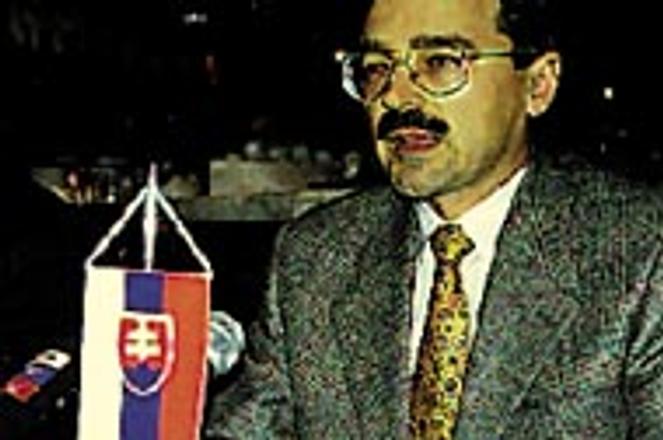European Commission Vice-President Sir Leon Brittan listens in as Foreign Minister Pavol Hamžík explains Slovakia's stance on trade in Russia at a press conference in Bratislava.Michaela Hazelová
While Slovakia continues to seek expanded trade relations with Russia, European Commission vice president Sir Leon Brittan, warned that the European Union (EU) will not accept a Slovak-Russian free trade agreement, but said his meetings with Slovak officials put his mind more at ease that no such accord is imminent.
In a speech to Slovak parliamentarians and business leaders at a March 21 reception in Bratislava, Brittan said that Prime Minister Vladimír Mečiar assured him that Slovakia will not negotiate a formal free-trade agreement (FTA) with Russia in the near future.
"I believe the risk of complications arising from negotiations between the Slovak Republic and Russia has been eliminated," Brittan said in a question-answer session following his speech. "There is now complete understanding on all sides."
In his speech, however, Brittan made it clear that "If Slovakia wishes to pursue the plan for a free trade agreement with the Russian Federation it should do so not only with a view to the effects such an agreement would have on its own Customs Union with the Czech Republic, but also the disruptive effects it could have on the smooth adoption by Slovakia of the EU's common commercial policy when and if it joins the union.
Indeed, since the EU does not at present have an FTA with Russia itself, Slovakia would have to renounce any such agreement with Russia if it was to join the EU."
"I would strongly urge Slovakia. . . not to proceed with any plans for a Slovak-Russian FTA until Russian membership to the WTO has been secured," Brittan continued. "When that is the case, both Slovakia and Russia. . .will be able to regulate their bilateral trading relationship in a way fully compatible with WTO obligations and so conform more easily with the eventual demands" of the EU.
Nothing to fear
Foreign Minister Pavol Hamžík reaffirmed Slovakia's promise not to overstep the bounds of its EU pre-accession status in an address to the Slovak Parliament on March 18.
"Concerns or even dramatization. . . of the Slovak government's intention to adopt liberalization measures in trade with the Russian Federation. . . or reproaches for not consulting [on] these steps with the relevant EU or WTO bodies do not reflect actual reality," Hamžík said, adding that such concerns "have been unnecessarily politicized."
Ivan Korčok, Hamžík's spokesman, told The Slovak Spectator that Brittan came away from his meetings in Bratislava with "more understanding" of Slovak-Russian trade. "Mr. Mečiar very precisely explained that we are fully aware of our obligations to the WTO, as well as [those of] our associate membership in the EU [but] Slovakia is doing everything it can to improve relations with Russia, especially [with regard to] the [Russian trade] deficit."
Brittan's exchange with Hamžík was equally frank, Korčok said. "Brittan said, 'Here is our problem. You have legitimate rights to solve your trade relations with any country. We will discuss this and stay in touch.' Our ministers are meeting regularly, and there are many regular structures where these concerns may be addressed."
Korčok said Slovakia's prime motive for improving trade with Russia is not to revive trade ties based on past relations, but to correct Slovakia's $2 billion deficit with its eastern partner. This is "the driving force of our policy," Korčok said. "From this viewpoint, everything is clear. . . If you have a trade deficit of $2 billion a year and that deficit comes from one country, every government in the world would look for a solution to such a problem."
Ján Foltín, state secretary at the Ministry of the Economy, backed up that view. "I believe that the West needn't be afraid of such an alliance," Foltín told The Slovak Spectator. "Last year 36.8 percent of Slovakia's imports came from EU countries, while 41.2 percent of our exports went to the EU. At the same time, our exports to Russia have actually decreased compared to last year." "There should be no fear-and I hope we convinced them of this-that Slovakia would abide by the rules and norms of WTO partnership and associated membership in the EU." Korčok added.Jan.-Feb. trade deficit narrows compared to '96
Analysts say shortfall still expected to be around 65 bill. Sk


